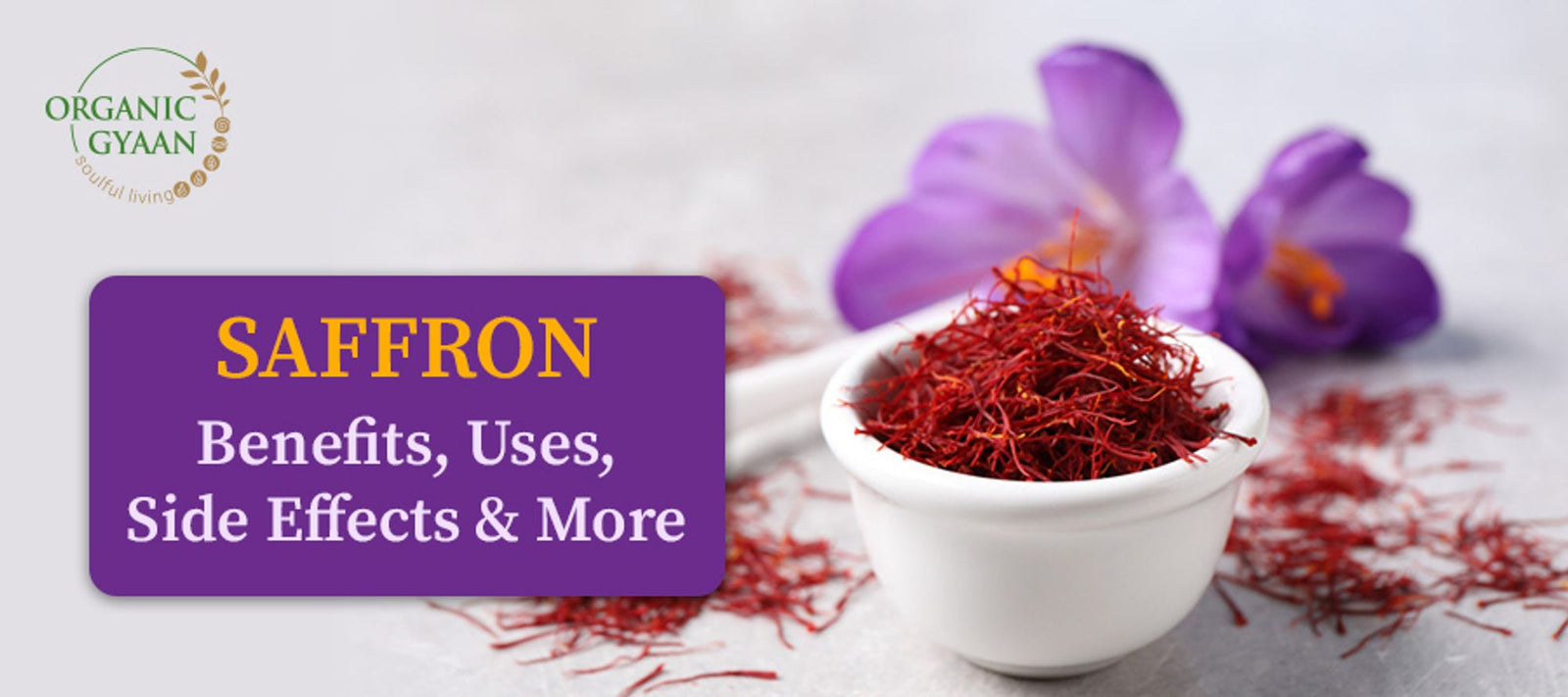तुम्हाला माहित आहे का की केशर हा जगातील सर्वात महागड्या मसाल्यांपैकी एक आहे, ज्याला "लाल सोने" म्हटले जाते? हा मौल्यवान मसाला त्याच्या चव, रंग आणि अनेक आरोग्य फायद्यांसाठी शतकानुशतके वापरला जात आहे. पण केशर म्हणजे नेमके काय आहे आणि ते तुमच्या दैनंदिन जीवनात कसे वापरले जाऊ शकते?
केशरचा परिचय
केशर हा क्रोकस सॅटिव्हस वनस्पतीच्या फुलापासून बनवलेला मसाला आहे. फुलातील चमकदार लाल धागे गोळा करून वाळवले जातात आणि मुख्यतः अन्नात मसाला आणि रंग म्हणून वापरला जातो. फक्त एक पौंड केशर तयार करण्यासाठी सुमारे ७५,००० केशर फुले लागतात, ज्यामुळे ते इतके महाग का आहे हे स्पष्ट होते. या ब्लॉगमध्ये, आपण केशर म्हणजे काय, ते कसे वापरावे, त्याचे फायदे आणि कोणतेही संभाव्य दुष्परिणाम याबद्दल बोलू.
केशर म्हणजे काय?
केशर हे केशर क्रोकस फुलाच्या कलंकापासून येते. हे मूळ नैऋत्य आशियातील आहे आणि हजारो वर्षांपासून त्याची लागवड केली जात आहे. केशर त्याच्या अद्वितीय चव, सुगंध आणि चमकदार पिवळ्या-नारिंगी रंगासाठी ओळखले जाते. जगभरातील अनेक पाककृतींमध्ये, विशेषतः भारतीय, पर्शियन आणि भूमध्यसागरीय पदार्थांमध्ये याचा वापर केला जातो. पारंपारिक औषधांमध्ये आणि नैसर्गिक रंग म्हणून देखील याचा वापर केला जातो.
केशरचे पौष्टिक प्रोफाइल
केशर केवळ चवीलाच नाही तर पोषक तत्वांनीही परिपूर्ण आहे. १ टेबलस्पून (२ ग्रॅम) केशरमध्ये तुम्हाला काय मिळते ते येथे आहे:
|
पोषक घटक |
रक्कम |
|
कॅलरीज |
६ |
|
प्रथिने |
०.२४ ग्रॅम |
|
कार्बोहायड्रेट्स |
१.३७ ग्रॅम |
|
फायबर |
०.२ ग्रॅम |
|
जाड |
०.१२ ग्रॅम |
|
व्हिटॅमिन सी |
१.६ मिग्रॅ |
|
मॅंगनीज |
०.६ मिग्रॅ |
|
लोखंड |
०.२३ मिग्रॅ |
|
पोटॅशियम |
३४ मिग्रॅ |
केशरचे आरोग्य फायदे
१. केशर मूड वाढवते
केशर तुमचा मूड सुधारण्यास मदत करू शकते. ते मेंदूतील सेरोटोनिनची पातळी वाढवते, ज्यामुळे नैराश्य आणि चिंताची लक्षणे कमी होण्यास मदत होते. केशरचा नियमित वापर तुम्हाला अधिक आनंदी आणि आरामदायी वाटू शकतो. एका अभ्यासात असे आढळून आले आहे की केशर पूरक आहारामुळे प्रौढांमध्ये नैराश्याची लक्षणे लक्षणीयरीत्या कमी होतात.
२. केशर हृदयाच्या आरोग्यास प्रोत्साहन देते
केशर तुमच्या हृदयासाठी चांगले आहे. त्यात अँटीऑक्सिडंट्स असतात जे हृदयातील ताण आणि जळजळ कमी करतात. केशर रक्तदाब आणि उच्च कोलेस्टेरॉलची पातळी कमी करण्यास देखील मदत करते, ज्यामुळे हृदयरोगाचा धोका कमी होतो. केशरमधील पोटॅशियम (प्रति चमचा 34 मिलीग्राम) रक्तदाब नियंत्रित करून तुमचे हृदय निरोगी ठेवण्यास मदत करते.
३. केशर पचनास मदत करते
केशर तुमच्या पचनक्रियेला मदत करू शकते. ते पाचक एंजाइम्सच्या उत्पादनास उत्तेजन देते, ज्यामुळे पोटफुगी, गॅस आणि इतर पचन समस्या कमी होण्यास मदत होते. केशरचे दाहक-विरोधी गुणधर्म पचनसंस्थेला शांत करतात आणि एकूण पचन सुधारतात.
४. केशर डोळ्यांच्या आरोग्यास मदत करते
केशरमध्ये कॅरोटीनॉइड्स असतात जे तुमच्या डोळ्यांसाठी चांगले असतात. हे संयुगे रेटिनाचे संरक्षण करतात आणि दृष्टी सुधारतात. अभ्यासातून असे दिसून आले आहे की केशर दृष्टी सुधारू शकते आणि वयाशी संबंधित दृष्टी समस्यांपासून संरक्षण करू शकते. तुमच्या आहारात केशरचा समावेश केल्याने तुमचे डोळे निरोगी राहण्यास मदत होऊ शकते.
५. केशर रोगप्रतिकारक शक्ती वाढवते
केशरमध्ये अँटीऑक्सिडंट्स आणि व्हिटॅमिन सी भरपूर प्रमाणात असते, जे तुमची रोगप्रतिकारक शक्ती वाढवण्यास मदत करतात. हे पोषक घटक तुमच्या शरीराचे संक्रमणांपासून संरक्षण करतात आणि एकूण आरोग्याला आधार देतात. केशरचा नियमित वापर केल्याने तुम्ही निरोगी राहू शकता आणि आजारांशी लढू शकता.
६. केशर त्वचेचे आरोग्य सुधारते
केशर हे त्वचेच्या फायद्यांसाठी ओळखले जाते. ते मुरुमे, डाग आणि काळे डाग कमी करण्यास मदत करू शकते. केशरमधील अँटीऑक्सिडंट्स तुमच्या त्वचेचे नुकसान होण्यापासून संरक्षण करतात आणि ती निरोगी आणि अधिक तेजस्वी बनवतात. दूध किंवा मधात मिसळून केशर लावल्याने तुमच्या त्वचेचा पोत आणि देखावा सुधारू शकतो.
७. केशर वजन व्यवस्थापनास मदत करते
केशर तुमचे वजन नियंत्रित करण्यास मदत करू शकते. ते भूक कमी करते आणि जास्त खाण्यापासून रोखते, ज्यामुळे वजन कमी होण्यास मदत होते. केशर पोटभरेपणाची भावना वाढवते आणि खाणे कमी करते हे सिद्ध झाले आहे. एका अभ्यासात असे आढळून आले आहे की केशर अर्काने जास्त वजन असलेल्या महिलांमध्ये शरीराचे वजन आणि चरबी लक्षणीयरीत्या कमी केली आहे.
केशर कसे वापरावे
तुमच्या दैनंदिन दिनचर्येत केशर वापरण्याचे काही सोपे मार्ग येथे आहेत:
१. स्वयंपाक आणि बेकिंग : चव आणि रंगासाठी भात , सूप आणि मिष्टान्नांमध्ये काही केशर घाला.
२. चहा : सुगंधित आणि शांत करणारा चहा बनवण्यासाठी गरम पाण्याने केशराचे धागे तयार करा.
३. त्वचेची काळजी : नैसर्गिक चमक येण्यासाठी केशर दूध किंवा मधात मिसळा आणि ते तुमच्या त्वचेला लावा.
४. पूरक आहार : आरोग्याच्या फायद्यांसाठी कॅप्सूल किंवा अर्कच्या स्वरूपात केशर पूरक आहार घ्या.
केशरचे संभाव्य दुष्परिणाम
जरी बहुतेक लोकांसाठी केशर सुरक्षित असले तरी, जास्त प्रमाणात घेतल्याने काही दुष्परिणाम होऊ शकतात:
१. अॅलर्जीक प्रतिक्रिया : काही लोकांना केशरची अॅलर्जी असू शकते, त्यांना पुरळ येणे किंवा श्वास घेण्यास त्रास होणे यासारखी लक्षणे जाणवू शकतात.
२. मळमळ आणि उलट्या : केशरच्या जास्त डोसमुळे मळमळ, उलट्या आणि चक्कर येऊ शकते.
३. गर्भधारणेच्या गुंतागुंत : गर्भवती महिलांनी मोठ्या प्रमाणात केशर टाळावे कारण ते गर्भाशयाला उत्तेजित करू शकते आणि गर्भपात होऊ शकते.
निष्कर्ष
केशर हा एक बहुमुखी आणि शक्तिशाली मसाला आहे ज्याचे अनेक आरोग्य फायदे आहेत. मूड आणि हृदयाचे आरोग्य सुधारण्यापासून ते त्वचा सुधारण्यापर्यंत आणि पचनास मदत करण्यापर्यंत, केशरचे फायदे व्यापक आहेत. तुमच्या दैनंदिन दिनचर्येत केशरचा समावेश केल्याने तुमचे आरोग्य सुधारू शकते आणि तुमच्या जेवणात स्वादिष्ट चव येऊ शकते.
केशरचे फायदे अनुभवण्यास तयार आहात का? आजच तुमच्या आहारात या अद्भुत मसाल्याचा वापर सुरू करा आणि त्याचे अनेक आरोग्यदायी फायदे घ्या.





















